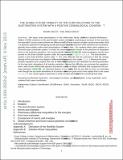The global future stability of the FLRW solutions to the Dust-Einstein system with a positive cosmological constant
Author(s)
Hadžić, Mahir; Speck, Jared R.
DownloadSpeck_The global future.pdf (713.6Kb)
OPEN_ACCESS_POLICY
Open Access Policy
Creative Commons Attribution-Noncommercial-Share Alike
Terms of use
Metadata
Show full item recordAbstract
We study small perturbations of the Friedman–Lemaître–Robertson–Walker (FLRW) solutions to the dust-Einstein system with a positive cosmological constant in the case that the space-like Cauchy hypersurfaces are diffeomorphic to 𝕋3. We show that the FLRW solutions are nonlinearly globally future-stable under small perturbations of their initial data. In our analysis, we construct harmonic-type coordinates such that the cosmological constant results in the presence of dissipative terms in the evolution equations. Our result extends those of [I. Rodnianski and J. Speck, The nonlinear future stability of the FLRW family of solutions to the irrotational Euler–Einstein system with a positive cosmological constant, J. Eur. Math. Soc. 15 (2013) 2369–2462; J. Speck, The nonlinear future stability of the FLRW family of solutions to the Euler–Einstein system with a positive cosmological constant, Selecta Math. 18 (2012) 633–715; C. Lübbe and J. A. Valiente Kroon, A conformal approach for the analysis of the nonlinear stability of pure radiation cosmologies, Ann. Phys. 328 (2013) 1–25], where analogous results were proved for the Euler–Einstein system under the equations of state [mathematical equation]. The dust-Einstein system is the case c[subscript s] = 0. The main difficulty that we overcome here is that the dust's energy density loses one degree of differentiability compared to the cases [mathematical equation] which introduces many obstacles for closing the estimates. To resolve this difficulty, we commute the equations with a well-chosen differential operator and derive elliptic estimates that complement the energy estimates of [I. Rodnianski and J. Speck, The nonlinear future stability of the FLRW family of solutions to the irrotational Euler–Einstein system with a positive cosmological constant, J. Eur. Math. Soc. 15 (2013) 2369–2462; J. Speck, The nonlinear future stability of the FLRW family of solutions to the Euler–Einstein system with a positive cosmological constant, Selecta Math. 18 (2012) 633–715]. Our results apply in particular to small perturbations of the vanishing dust state containing vacuum regions.
Date issued
2015-03Department
Massachusetts Institute of Technology. Department of MathematicsJournal
Journal of Hyperbolic Differential Equations
Publisher
World Scientific
Citation
Hadžić, Mahir, and Jared Speck. "The global future stability of the FLRW solutions to the Dust-Einstein system with a positive cosmological constant." Journal of Hyperbolic Differential Equations 12:1 (2015), pp. 87-188.
Version: Original manuscript
ISSN
0219-8916
1793-6993